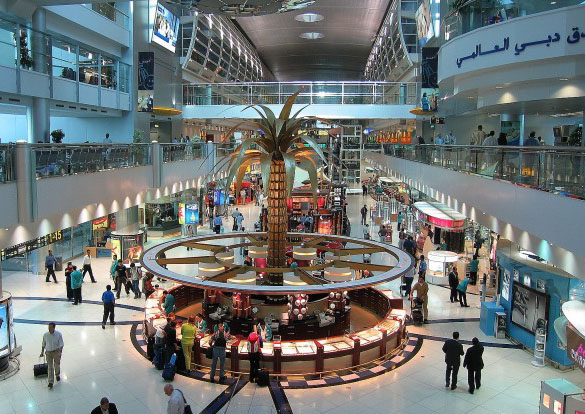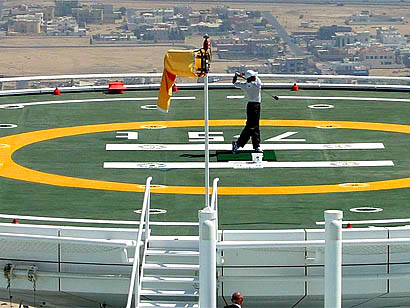Dubai, one of the seven United Arabs Emirates (UAE), has captured the attention of the world as global city with a globally competitive economy. The city is has been known for oil industry but this has been replaced by its comprehensive tourism industry, hosting of events and construction projects. It is therefore evidenced that development of Dubai is line with concepts of globalisation and commodification. Globalisation is a function of Economy, Environment, Culture, Society and Politics, and effect on one result in effect on the other.
Commodification is the process by which formerly non- economic things and relationships like institutions, objects, attributes, signs and even people are turned into commercial things whose prime purpose is sale in the market place, as Blunden (1975) explains. According to Marxist political economy it refers to the extension of market trade to formerly non-market areas, and to the handling of things as if they were a tradable commodity (Blunden,1975)
A commodity is typically associated with 3 types of values: use value referring to the design of commodities to meet certain need either physically or psychologically; Exchange value as they can be bought and sold in the market with money, and finally commodities have sign value as they act as mode of self-expression in a battle for social position. (Gottdiener, 2000, 26)
In Dubai the global media has influenced the society by laying emphasis on the three value of a commodity. The use value of commodities implies that for every need there a product claiming to satisfy it. This has lead to continue product differentiation to meet the arising needs.
Labour in Dubai has been heavily commodified with the growth of the fashion industry. The socialisation of women to do domestic work such as dressmaking, cooking, cleaning and caring for the children among others for free has changed. The Dubai shopping mall is a classic example of how the otherwise non-economic dressmaking has been commodified and the fashioners are making lots of money.

Leisure has been largely commodified in Dubai with distancing from work being perceived as prestigious and a symbol of honour. This is in agreement with Veblen’s observation that, conspicuous leisure; which means distancing oneself from industrial work attracts admiration. (Veblen, 1899).
Commodification of labour, education, government service like education among others have been accelerated by globalisation, whose prime aim is to reduce people’s diversity by restricting individuals’ freedom with the promise of economic gains.
Another issue to consider is the increasing commoditization of the city and its impact in the eyes of tourists. According to what Galdauskas (2008) says, commoditization is a two-part complicated process which requires certain efforts and time. However, it must be kept in mind that the process allows to promote the place so that it could bring more profit and attract more tourists.
However, Galdauskas (2008) warns that to achieve this goal, one will have to make sufficient alterations concerning the way the place looks and the facilities it can suggest to the newcomers (38). Thus, the question of national identity rises against the idea economical profit. To ensure the balanced correlation between the two, considerable efforts must be made.
It is evident that both the part involving “dramatization of life on the stage” (38), as Galdauskas (2008) put it, and the one concerning the preservation of national identity are leveled in Dubai. However, it does not mean that the process of commoditization must run uncontrolled in the city.
Since one of the main concerns of the space regeneration is the idea of keeping the national identity, as Universidad de Barselona (1977) claims (77), it becomes clear that the key priority of Dubai citizen at present is to ensure that tourism can coexist with their national identity – otherwise they will be forced to abandon the former to preserve their sense of national dignity.
Still, taking into account the culture of Dubai, it can be considered that its citizen can cope with preserving their national identity. Since people flood Dubai to indulge into sightseeing and all kinds of attractions, they bring certain misbalance into its established structure. Foreign elements in the clockwork of Dubai, they slowly make the city dissolve. To prevent Dubai from being gobbled by another culture, people have to undertake certain measures.
Another aspect of the problem, the space regeneration, deals with the economical issues. In this case, the principle of mutual recoupment can be put into practice: thus, certain spaces can be restored using the tourism incomes. According to what Universidad de Barselona (1977) suggests, the balance between tourism and the space and place maintenance can be achieved once the “appropriateness to the work in relationship to the place” (133) has been achieved.
However, to achieve this goal, the dwellers of Dubai will have to follow the main principles of the Consumption Theory. Thus, one of the first challenges which the dwellers of Dubai are going to face is how to level the supply and the demand.
Utilizing the principle of rationality, as Sherman (2008) suggests (332), it will be possible to achieve the desirable result. However, there are certain issues which require special attention of the entrepreneurs and the government of Dubai. For instance, it is crucial for the city to take into account the principle of rationality. Thus, the chief goal of Dubai is to suggest its guests the necessary attractions and entertainments which they suppose to encounter in here.
An advancement of an integration agenda between nations and it entails the widening of economic markets (Mittelman, 1997. pp. 2) globalisation has brought various benefits such as: growth of tourism industry through the movement freedom, enhanced trade widen access to information, rapid diffusion of creative and innovations, specialisation of work and benefit from large scale of production where countries produce what they can better and cheaply produce for local and export while they import what they cannot produce, enabling international relations and this has resulted to rapid economic growths as well as improved living standards.
The immense impact of globalisation is felt in Dubai from all aspects of life i.e. Economy, Environment, Culture, Society and Politics. The great extent of globalisation in Dubai is demonstrated by its rapidly growing tourism industry with such baits for tourists as: Burj Al-Arab – the only seven-star hotel in the world and an international icon of Dubai and Palm Jumeirah- an on-going project of the largest artificial island in the Arabian Gulf. The Dubai’s special features have been a major focus for the global media. (Elsheshtawy, 2004).
The hosting of international sports has had immense gains for the Dubai’s economy. Although these prizes are won by the foreigners, they spend some of the money in Dubai. Also the fans of sport come in large numbers to watch the sports further contributing to the growth of tourism industry in Dubai. The city has become well-known for hosting famous tennis and golf tournaments, with Andre Agassi, Roger Federer and Tiger Woods promoting Dubai. (Student Personal World Wide Web Pages.2)

The integration of Dubai with other emirates to form United Arab Emirate and a further collaboration between the UAE and other countries has opened its market to the foreign investors. “Dubai attracts foreign investors and corporations because of the considerable economic opportunities offered to businesses there.” (Hollis, 2000, 52) Off shoring is a classic example which entails transfer of commodities from one country to another.
Globalisation results in the free movement of people from one region to another. Dubai continues to create global job opportunities for low waged workers. According to Lang LaSalle the employment rate in Dubai has grown to 8.3 percent per annum while the population is growing at 5.8 per cent per annum (2004). This means the economy will continue to get more workforces locally and from international market.
The high level of globalisation has had negative effects on Dubai society. Some of the negative impacts of globalisation include: the freedom of movement of people from one country to another has made it difficult for the natives to preserve their culture and religion. Islamic had been the predominant religion in Dubai but with globalisation, other religions come up.
This resulted in change of weekend from Saturday –Sunday to Friday-Saturday in a bid to accommodate both Muslims who emphasis on holiness of Friday and Christians who respects Saturday-Sunday. There is a conflict between the native’s culture and the western.
In a global market an economic recession affect the whole world with the poor and middle income population being hit harder. As Hari (2009) emphasized, because of the economical crisis in Dubai a number of workers suffered great losses; many of them were not paid and thus could not leave the countries. Hari observed that policemen intimidated the workers who complained or left their stations. (2009, pp6).
Other negative effects of globalisation in Dubai include the increase in the prostitution which is as a result of the rapid growth in tourism. Globalisation enhances capitalism resulting in poor getting poorer thus the poor population of Dubai has turned to illegal business like prostitution, drugs and arms smuggling and also terrorism, as Davidson (2009) mentioned (p. 247).
Commodification and globalisation have had both positive and negative impact in Dubai with the former outweighing the later. It is important for Dubai government to come up with policies that will enhance globalisation and commodification for Dubai to be consistent with the national development goals.
Government should try to bridge the gap between the poor and the rich and reduce instances of crime and prostitution as this will not only devalue humankind but it also increases disease transmissions. If Dubai has to remain a world class city, it has to deal with social problems of its citizens.
Reference List
Blunden, A., ed. Commodification, Encyclopedia of Marxism. Web.
Davidson, Christopher M., 2009. Dubai: the vulnerability of Success. New York, Columbia University Press.
Elsheshtawy, Y., 2004. Planning Middle Eastern cities, an urban kaleidoscope in a globalizing world, Stamford, CN, Cengage Learning.
Galdauskas, K. et al., 2008. Serving culture: tourists, lobsters and restaurants of Ogunquit, Maine. Ann Arbor, MI, Pro-Quest.
Gottdiener, M, 2000. New forms of consumption. Oxford, Blackwell.
Hari, J., 2009. The dark side of Dubai. The Independent (London). Web.
Hollis, R. 2000. Managing new developments in the Gulf. Washington, DC.Brookings Institution.
LaSalle, J. L., 2004 Winning cities of the decade. Web.
Sherman, H. J., et al., 2008 Economics: An Introduction to Traditional and Progressive Views. Armonk, NY, M. E. Sharpe, Inc.
Student Personal World Wide Web, The effect of globalization on Dubai’s economic development: Web.
Universidad de Barcelona, 1977 Urban Generation: A Challenge for Public Art. Barcelona, Edicions Universitat Barcelona.
Veblen, T. (1899). The Theory of the Leisure Class New York, NY, New America Library.